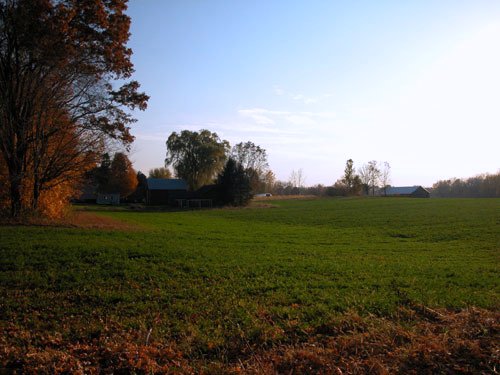
Photo: Hadley, MA
I’ve always had romantic notions about living in the country. I’ve dreamed of waking up early and going for long walks and surveying the many acres on my “property” ; maybe encountering wild life and foraging for wild mushrooms (just like Mayle’s book, “A Year in Provence”). I would certainly take refuge in the fact that I could not see another neighbor for miles and enjoy fresh country air entering a rustic, but chic, 19th century farmhouse (renovated with all the necessary modern conveniences, of course). Our country home would be near the sea as well, so I could enjoy the water at the beginning of each day.
The above is just a dream, of course. And the fact is that
suburbanites in American are significantly more satisfied with their living arrangements than are residents of cities, small towns or rural areas, according to a Pew Research Center Social & Demographic Trends. Our family lives in a relatively small town (about 9,000 citizens) just 10 minutes outside of New York City in New Jersey. Our town has a suburban feel with many trees, sidewalks, lawns/ivy, and an active, family-oriented, base population. The proximity to a major city, however, does skew the town feel a bit towards the urban, at times.
Choosing where to live is a major life decision and folks are usually influenced by several factors including:
– price of homes.
– quality of schools.
– proximity to job(s).
– proximity to other family members / where they grew up.
– safety.
– available social/recreation activities
– available commercial outlets (shopping).

Photo: Harris Farm, Hollis, NH
As I see it, living in a suburban/urban area has many advantages and while I dream of the rural life enjoyed by my Italian family in Calabria, I could not spend the majority of my time in the country (at least at this stage of my life). Living in a suburban area allows me to:
1. Enjoy my extended family and good friends.
2. Enjoy a short commute to my job (and the availability of potential future jobs)
3. Access to good food/recreation/commercial establishments (I can play tennis, go food shopping, and find virtually any product I may need all within ten miles of my home).
4. Access to different people and cultures (in today’s world, if you can’t speak the language of diversity and feel comfortable with folks from different part of the globe you might as well have no skill set)
5. Access to educational resources (this not only means good schools for our kids, but also access to libraries, universities, lectures, etc. for adults; if you stop learning, then you stop living)
The suburbs do have disadvantages and I’m sure the average New Yorker, for example, will rattle off many reasons why they’re happy to exist only on the Island of Manhattan, but there does seem to be some difficulty in living, long term, in an urban environment (such as cost <
see Free Money Finance’s article on cities and cost of living>, proximity to other people, space, etc.).
I’ll stick to the Burbs for now and aspire to short stints by the sea and the chic countryside.
Related Posts from Scordo.com
 Author: Vincent Scordo
Author: Vincent Scordo
Lead Italophile (and/or lover of all things Italian).



